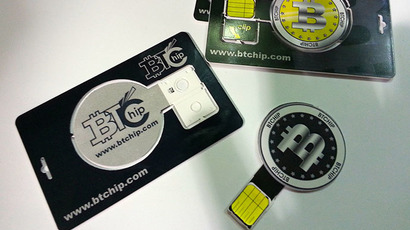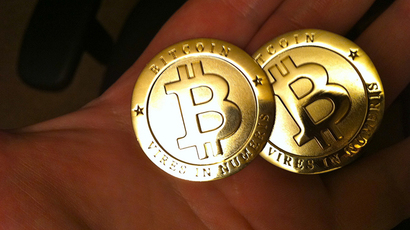Growing Bitcoin buzz: In-person Bitcoin exchanges make a splash in Berlin
Supporters of Bitcoin spent Saturday engaging in personal exchanges in Berlin, taking place in a mobile art space which supports the cryptocurrency. Its official recognition by the German state earlier this month is only aiding its expansion.
Bitcoin first burst onto the global scene in 2008 and has since
been gaining rapid momentum. Germany is fast becoming a hotbed of
exchanges, with August 16 marking its official recognition by the
country under the term “Rechnungseinheiten,” which roughly
translates to “units of account.”
“It’s a real step towards it becoming a universally, accepted,
legitimate other option to state-issued currencies,” said
RT’s Peter Oliver in Berlin. In some places in the German
capital, people even use the parallel currency to pay for simple
commodities such as food and drink. Numerous small online
merchants also accept it.
Bitcoin Exchange Berlin hosted their third meeting on Saturday at the city’s Platoon
Kunsthalle (Platoon Art Hall) to launch a European hub where
people can both buy and sell a selection of products using
Bitcoin and buy and sell the currency itself in a stock-exchange
type climate.
“We’ve got many innovative people here from all over the
world, coming together," Aaron Koenig, founder of Bitcoin
Exchange Berlin, told RT. "Berlin has always been a place to
try out new things. Did you know that the computer was invented
in Berlin? So I think that it’s just natural that Bitcoin is very
strong here.”
Buyers attend with notebooks or electronic devices in order to
create an account with the currency and buy it. People attending
the gatherings are actively encouraged to set up a ‘wallet’
through which transactions can take place.
Germany’s “BXB” (Bitcoin Exchange Berlin) site lists as its
intention the provision of the opportunity for members of the
Bitcoin community “to meet and collaborate on ideas” in
the hope of broadening the community itself and bringing the
currency to higher prominence within “Berlin, Germany, Europe
and around the world.”
The official recognition of the currency means that profits
reaped from its sales should be officially taxed as income.
However, the sales tax would only be applicable to commercial,
rather than private transactions, and while recognized, it is not
yet categorized as an official currency.
“It [taxation] may well be a lot harder than that sounds. Because
of the actual nature of Bitcoin – it is a peer-to-peer online
currency – it’s essentially anonymous by the entire nature of it
– it would be very hard to track down just who was selling to
whom for tax purposes, so it may not work out how the state
fancies it,” said Oliver.
Koenig believes that the impact of the ruling on Bitcoin's future
remains to be seen.“It [the decision] brings clarity," he
said. "It’s clear that it will never be illegal and hopefully
they’re setting a standard. I don’t think we should have too many
rules but should rather see how it develops.”
This is not the first time that an official stance has been taken
on Bitcoin: At the beginning of August, a US federal judge in
Texas ruled that Bitcoin is a legitimate currency. Both decisions
opened up the possibility for the virtual money to be regulated
by governments, which oppose the original concept of Bitcoin – a
peer-to-peer, relatively anonymous payment.
However, within the last two weeks, a New York regulator
announced an investigation into virtual currencies such as
Bitcoin, claiming that they could be abused by gun runners and
drug traffickers and could pose a threat to US national security.
Other countries have taken a much harsher line: Thailand has
banned it.














